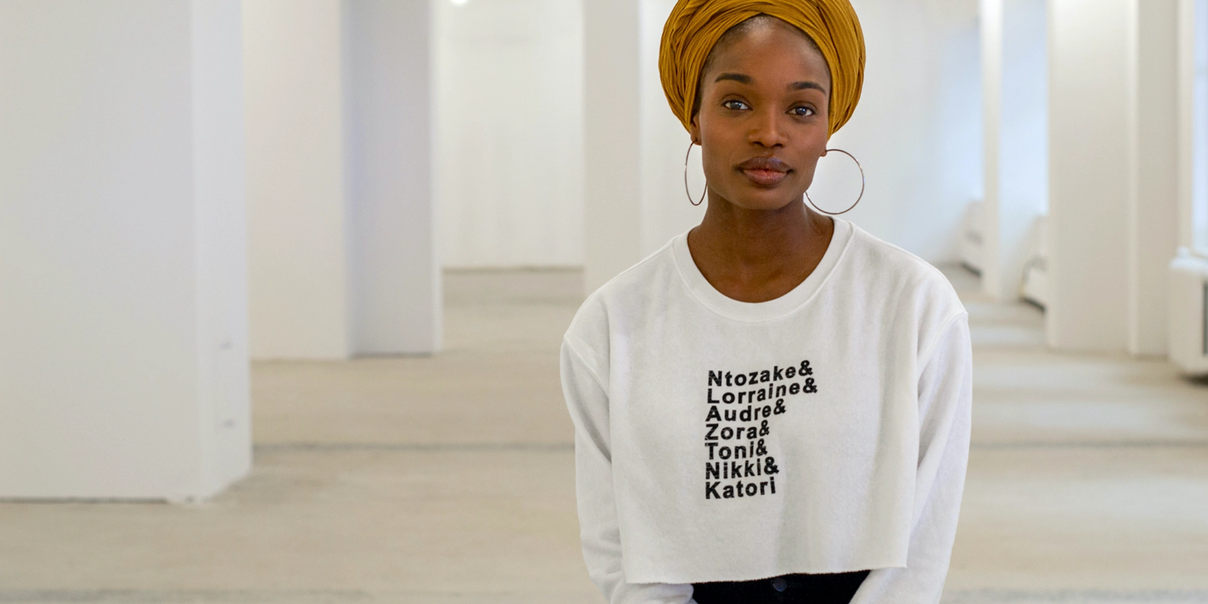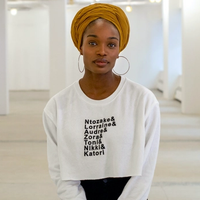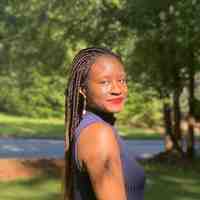
Interview with Erika Dickerson-Despenza: ‘Write the Thing that Changes the World’
Meet the Participants

Erika Dickerson-Despenza is a Blk, queer feminist poet-playwright and cultural-memory worker from Chicago, Illinois. She is a 2020 Grist 50 Fixer and was a National Arts & Culture Delegate for the U.S. Water Alliance’s One Water Summit 2019. Awards: Laurents/Hatcher Foundation Award (2020), Thom Thomas Award (2020), Lilly Award (2020), Princess Grace Playwriting Award (2019). Residencies & Fellowships: Tow Playwright-in-Residence at The Public Theater (2019-2020), New York Stage and Film Fellow-in-Residence (2019), New Harmony Project Writer-in Residence (2019), Dramatists Guild Foundation Fellow (2018-2019), The Lark Van Lier New Voices Fellow (2018). Communities: BYP100 Squad Member, Ars Nova Play Group (2019-2021), Youngblood Collective (EST). Commissions: The Public Theater, Studio Theatre & Williamstown Theatre Festival. Productions: cullud wattah (2019 Kilroys List) originally slated at The Public Theater, 2020; Victory Gardens Theater, 2021. Currently, Erika is developing a 10-play Katrina Cycle, including shadow/land and [hieroglyph] (2019 Kilroys List), focused on the effects of Hurricane Katrina and its state-sanctioned, man-made disaster rippling in & beyond New Orleans.

Charlene Adhiambo (she/her/hers) is a Kenyan American writer currently based in her hometown of Atlanta. Her one-act play Guardian was read at Saudade Theatre’s Re-Descobrimentos Festival in July 2020. Her creative work spans many mediums including (but not limited to), screenplay, stage play, fiction, essay, poetry, and song. While the containers and even genres of her work change, constant themes are mother- and daughterhood, black girl- and womanhood, friendship, romance, and grief. She writes in a space somewhere between Ray Bradbury and Toni Morrison, two of her favorite authors. When not writing, she is listening to R&B music, teaching herself guitar, or doing yoga. She received her B.A. in Creative Writing and English Literature from Columbia University.
This interview has been edited and condensed for clarity.
CA: Tell us about your theatre journey.
EDD: I’ve always been drawn to language. Language is what I do and the forms come after that. That’s the way my brain works more so than, “I wanna be a theatre artist!” I never really had that moment, I’m still actually waiting for that moment! I went to college knowing I was going to major in English Secondary Education as well as Theatre. I attended the University of Wisconsin-Madison, which is a predominantly white institution and is where Lorraine Hansberry, who was a Black queer woman from Chicago like me, actually began what would become A Raisin the Sun. I pursued the directing track in the Theatre program, as there was no playwriting track, and I didn’t think of playwriting as a serious career option for Black women. At that time, there was only Suzan Lori Parks and Lynn Nottage was stepping into her fame. Parks and Nottage had very different styles than me, and I didn’t necessarily see myself in their work, though I certainly saw myself in their aesthetics. There was Lydia R. Diamond and Katori Hall were just beginning to be widely known. But there weren’t young Black queer women writers who were visible in the industry.
I wrote my thesis in Cape Town, South Africa at the University of Cape Town and started my own theatre company at UW-Madison called The For Colored Girls Project. I was the Editor-In-Chief of our oldest multicultural women’s art magazine on campus, Women in Redzine. I was leveraging this and other leadership positions on campus to support The FCG Project. When we weren’t producing for colored girls who have considered suicide/ when the rainbow is enuf, we would do another work by, for and about women of color, particularly Black women. Unbeknownst to me at the time, our African American Studies department had been trying to produce for colored girls who have considered suicide/ when the rainbow is enuf, since the late 1970s, during the Black Studies movement, but it never came to pass. So, when I asked for the department to partner with me on my project, they thought it was laughable as they had failed. I said, “Well I’m going to do it!” I consider Ntozake Shange my literary mother, and I had a relationship with her before she died. So, when I told them about my plan, it was more an invitation than anything!
In the second year, we mounted Rhodessa Jones’ Big Butt Girls, Hardheaded Women. The show was rehearsed while I was abroad, and I cut my thesis trip to South Africa a few months short to view the show. At that time it was a solo show and The FCG Project adapted it into an ensemble piece—we were the first to do that.
So that’s how I came to the form. I never considered myself primarily a theatre artist or a playwright. I was a writer, teacher, and a cultural worker who made space for Black women and non-Black women of color to create and be free in that. When I graduated, I went to seminary and then taught fifth grade ELA and 6-8th grade Theatre for Social Justice in Dallas, Texas. After I realized how much I hated Texas and missed my organizing community in Chicago and a robust performing arts community, I moved to New York and accepted a Program Manager turned Education Specialist position with People’s Theatre Project, a social justice arts organization that creates ensemble-based theatre with and for immigrant communities to develop the next generation of diverse, socially-engaged artists and leaders. I redesigned their curricula and taught young people how to organize their local communities and devise and execute successful creative actions. After receiving the Lark Van Lier Fellowship for cullud wattah, I decided I was going to do something I never have before: be a full-time writer instead of an arts administrator who writes.
What made you make that leap?
There are things we are called to do on earth in the way that only we can do them. I am called to writing, and my other skills, experiential knowledge and spiritual training, are in service to my calling. If my calling is healing others through writing, then that was what all of my previous experiences were preparing me to do. Of course there are opportunities to flex my skills in other ways, but to dominantly sit in my calling is the thing I am learning to do.
What does water mean to you?
It’s funny, everyone asks me that.
Really? And I thought I was being smart!
Everyone asks me that, but that doesn’t make it any less important. What comes to me is different depending on who asks me and where I am physically. I am sitting a block from the Mississippi River right now. My paternal great cousin, Tony, passed in April, and I was going to be at Mardi Gras but I had auditions for my show, which ended up being canceled because of COVID. Tony, who was more like an uncle, was the first person to walk me to the Mississippi River. So I’m feeling his presence and his lessons on water very deeply right now.
In my work, water has always been very reflective of Black women. At first it was an unintentional thing that was in me that I was exploring, how Black women’s bodies reflect water in its nourishing qualities and its violent qualities. For example, giving birth is trauma to the body. But we know it results in this beautiful thing. I think of water in that way, where I can be in awe of this river that is so long and that so many of my people—Sicilian, African American, Afro-Creole—have crossed in many different places. Still, I can remember when the levees broke and see the evidence of that destruction even today. This is the contention: water is a beautiful danger; a life-giving undertaker. In one place people are at the beach, in another, people are dying in a hurricane or a flood.
Then I was thinking of Black women’s experiences, particularly the descendants of chattel slavery in the Americas and the Caribbean. There is something unexplored in theatre about the relationship to water that Black people have in the United States from the Middle Passage onward. My water tetralogy, which is still in development, came out of that. I was thinking about several distinct periods of history: the Middle Passage, the Mary Turner lynching in 1918, Hurricane Katrina and the state-sanctioned flood, and the Flint Water Crisis. I wanted to explore how these experiences, these traumas, affect our relationship with water now.
What does Black liberation look like in theatre?
I see a total divestment from white institutions. I see the complete self-determination of Black women artists in all of our diasporic, sexual, citified, southern, colored, mother-tongue diversity. Black people are not homogenous and neither are our visions for liberation in this work. I am disappointed that some of us are only asking for representation. When we do our diligent work to study how to do this work well so that it is sustainable and transformative—and not just Black faces in high places, with the same politics as the white people who are already here—then we learn that representation alone is not liberation. I also think about how many folks in theatre who do not come from movement backgrounds believe that unity is sameness rather than alignment, which means the same direction. There is this ahistorical notion that in past radical Black movements, there was no conflict or no vocalized difference of politics, ideology or strategy. We see this particularly in how some folks talk about the Civil Rights and Black Power movements. When in reality, when we study and remember, we learn that Ella Baker left SCLC because she didn’t agree with King’s leadership style, then went on to create SNCC. This is one of many examples. We pretend we have a history of Black movements where everyone just believed the same thing. It is natural and necessary for there to always be generative critique and dissension.
Thus, I am invested in radical liberatory visions, such as divestment from celebrity and capitalism, so that we are all great, so we are supplied with resources and rest, and there is no competition and no one is above criticism because they are famous or have the power to blacklist someone because they disagree. I’m more concerned with that than with how to make the industry a little less racist. How do we divest and talk about abolition in a way that excites theatre makers to move toward that long vision rather than simply invest in reform?
What is your advice for Black women, especially queer and trans women, entering this industry?
What I’m finding is that there is a desire to be in industry rather than a desire to tell the truth. Tell the truth and the right place and people will be divinely on their way. My focus, rather than having my plays produced, is having them published and read for thousands of years, so a Black girl in the future can find my archives. I believe in archives because of the importance of storytelling to the entire African Diaspora. We’re in a moment when the theatre industry doesn’t actually exist in the way we knew it. What’s your calling? What truth are you told to make clear and to whom are you accountable? I’m seeing folks feel empty because our industry is gone, but our stories aren’t, our truths aren’t. We’re still purposed to do that. Write the thing you’re called to write, not what’s popular or being produced. Write the thing that changes the world. Write the thing that changes you.
Interview by
Charlene Adhiambo